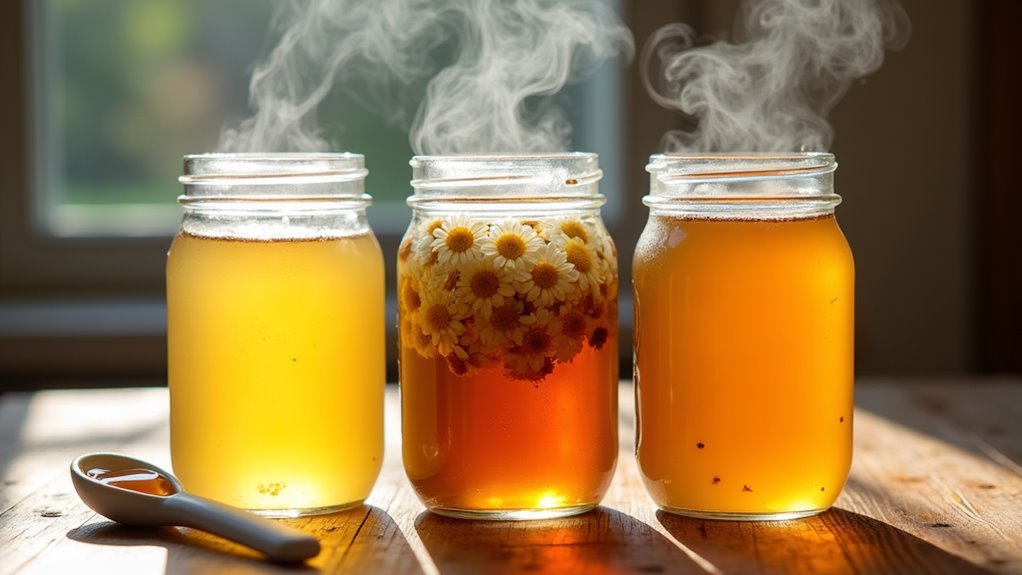Dry Cough Driving You Crazy. Try This Natural Fix
If you’re suffering from a persistent dry cough, try combining 1 tablespoon of raw honey with warm water (40-45°C) before bed and upon waking. This natural antitussive solution helps suppress the cough reflex while providing antimicrobial benefits. For enhanced relief, incorporate steam inhalation with thyme or eucalyptus essential oils, which offer bronchodilation effects. Maintaining indoor humidity at 30-50% supports optimal respiratory function. Understanding the full spectrum of natural interventions can maximize your therapeutic outcomes.
Understanding What Causes a Dry Cough
A dry cough, also known as a non-productive cough, occurs when your airways become irritated or inflamed without producing mucus or phlegm.
Common triggers include viral infections, allergies, asthma, gastroesophageal reflux disease (GERD), and environmental irritants like smoke or pollution.
When seeking dry cough remedies for adults, it’s crucial to identify the underlying cause. Your bronchial tubes may be experiencing inflammation from postnasal drip, chronic bronchitis, or ACE inhibitor medications.
Environmental factors such as low humidity, dust, or chemical fumes can also stimulate nerve endings in your airways, triggering the cough reflex mechanism.
Natural remedies containing raw honey and garlic can help soothe irritated airways while providing antimicrobial benefits against infection.
Signs Your Dry Cough Needs Medical Attention
While most dry coughs resolve on their own within 2-3 weeks, certain symptoms warrant immediate medical evaluation. You’ll need to monitor for signs that could indicate a more serious underlying condition requiring professional intervention.
| Warning Sign | Clinical Significance |
|---|---|
| Hemoptysis | Possible pulmonary hemorrhage or malignancy |
| Dyspnea | Respiratory compromise or cardiac involvement |
| Fever >101°F | Active infection or inflammatory process |
| Weight loss | Systemic disease or neoplastic condition |
If you experience any of these symptoms alongside your dry cough, don’t wait to seek medical care. Early intervention can prevent complications and improve treatment outcomes.
Using a warm salt gargle can provide temporary relief while waiting to see your doctor.
Honey and Warm Water: A Time-Tested Solution
You’ll find that honey’s innate antimicrobial and antitussive properties make it an effective natural remedy for suppressing dry coughs.
The viscous nature of honey creates a protective coating on irritated throat tissues while its high osmolarity helps reduce inflammation through mechanical barrier formation.
When combined with warm water at 40-45°C (104-113°F), honey’s therapeutic compounds become optimally bioavailable for maximum efficacy.
For best results, mix one tablespoon of honey with warm water or herbal tea to quickly soothe an irritated throat.
Healing Properties of Honey
Since ancient times, honey has demonstrated significant therapeutic properties in treating dry cough and respiratory ailments. The glucose oxidase enzyme in honey produces hydrogen peroxide, creating a potent antimicrobial environment that inhibits bacterial growth.
You’ll find that honey’s high osmolarity draws fluid from inflamed tissues, reducing irritation in your throat.
The natural compound DCA (dichloroacetate) in honey suppresses the cough reflex by modulating sensory nerve endings. Its thick viscosity creates a protective barrier over irritated mucous membranes, while flavonoids and phenolic compounds provide anti-inflammatory benefits.
These bioactive components work synergistically to soothe your respiratory tract.
Creating the Perfect Mix
Three essential factors determine the optimal honey-water mixture for treating dry cough: temperature, concentration, and timing.
Mix one tablespoon of raw honey into 8 ounces of water heated to 140°F (60°C). This temperature preserves honey’s enzymatic properties while enabling complete dissolution.
Don’t exceed 160°F (71°C), as this degrades honey’s therapeutic compounds.
For maximum efficacy, consume this solution 30 minutes before bedtime and upon waking. You’ll need three daily doses during acute phases.
The mixture’s osmotic gradient helps reduce laryngeal inflammation while coating irritated throat tissues. Clinical studies indicate this precise ratio optimizes honey’s antimicrobial and antitussive properties.
Essential Oils That Combat Dry Cough
While conventional treatments offer relief from dry cough, specific essential oils have demonstrated notable antitussive and expectorant properties through clinical research.
You’ll find thyme oil’s thymol compound effectively suppresses cough reflexes, while eucalyptus oil’s 1,8-cineole content provides bronchodilation and mucolytic effects.
Peppermint oil’s menthol constituent delivers both antitussive and decongestant benefits. Tea tree oil exhibits antimicrobial activity against respiratory pathogens.
For optimal therapeutic effects, you’ll need to combine 2-3 drops each of these oils with a carrier oil.
Studies indicate inhalation via steam or diffusion provides the most efficient delivery method for respiratory applications.
Ancient Egyptians recognized the therapeutic potential of eucalyptus and peppermint oils for respiratory relief thousands of years ago.
Herbal Teas for Cough Relief
When seeking relief from a persistent dry cough, you’ll find therapeutic benefits in precise combinations of herbal teas, such as thyme paired with marshmallow root or licorice root combined with mullein.
You’ll need to master proper brewing techniques, including water temperature control and steeping duration, to extract the optimal concentration of active compounds from your chosen herbs.
Following evidence-based preparation methods ensures you’ll achieve maximum bioavailability of the herbs’ expectorant and antitussive properties.
Consider adding raw honey to your herbal tea for enhanced cough-suppressing benefits and antimicrobial protection.
Best Herbal Tea Combinations
Several herbal tea combinations have demonstrated significant efficacy in alleviating dry cough symptoms through their synergistic therapeutic properties.
You’ll find optimal relief by combining thyme with marshmallow root, which provides both antitussive and mucolytic benefits.
Licorice root paired with ginger creates a potent anti-inflammatory effect while suppressing cough reflexes.
For enhanced bronchodilation, mix mullein with peppermint, as their combined compounds facilitate respiratory function.
Another evidence-based combination integrates echinacea with elderberry, leveraging their immunomodulatory and antiviral properties to address underlying infection triggers.
Preparation and Brewing Tips
To maximize the therapeutic compounds in herbal teas for cough relief, proper preparation techniques must be implemented with precision.
You’ll need to steep roots and barks for 15-20 minutes in water heated to 212°F (100°C), while delicate flowers and leaves require only 5-7 minutes at 185°F (85°C).
For optimal extraction, cover your brewing vessel to prevent volatile oils from escaping.
Don’t exceed recommended steeping times, as over-extraction can release excessive tannins.
Strain thoroughly using a fine-mesh strainer, and consume while hot to benefit from the steam’s expectorant properties.
Store unused portions in an airtight container for up to 24 hours.
Steam Inhalation Techniques and Benefits
Steam inhalation stands as one of the most effective non-pharmacological interventions for managing dry cough symptoms.
You’ll achieve optimal results by maintaining water temperature between 140-160°F (60-71°C) and positioning your face 8-12 inches above the steam source.
For maximum therapeutic benefit, you’ll need to perform 10-15 minute sessions, twice daily. The warm humidity helps hydrate the bronchial passages, reduces inflammation, and liquefies mucus secretions.
Adding eucalyptus oil or thyme extract can enhance antimicrobial properties and provide additional bronchodilation effects.
Always drape a towel over your head to create a steam tent, ensuring efficient vapor delivery to your respiratory tract.
Transform the experience into a magical spa atmosphere by incorporating essential oils and engaging in imaginative play.
Natural Foods That Soothe Throat Irritation
When inflammation irritates your throat during a dry cough, specific nutrient-rich foods can provide immediate soothing effects through their anti-inflammatory and antimicrobial properties.
Incorporating these evidence-based therapeutic foods can help reduce pharyngeal discomfort:
-
Raw honey contains hydrogen peroxide and natural enzymes that suppress cough reflexes while coating irritated mucous membranes.
-
Ginger root’s bioactive compounds (gingerols and shogaols) decrease inflammation and bronchial sensitivity.
-
Marshmallow root’s mucilage creates a protective film over inflamed throat tissue while delivering antioxidant flavonoids.
These natural compounds work synergistically to modulate your body’s inflammatory response while providing localized relief.
Using a steam inhalation session before bed helps maximize the benefits of these natural remedies.
Lifestyle Changes to Prevent Dry Cough
To minimize respiratory irritation, you’ll need to consume adequate fluids throughout the day while maintaining optimal hydration levels of 2.5-3.5 liters daily.
Your indoor environment should maintain relative humidity between 30-50% using a calibrated hygrometer and humidification system to prevent mucous membrane desiccation.
You must identify and eliminate exposure to common irritants such as tobacco smoke, strong fragrances, and airborne allergens that can trigger bronchial hypersensitivity and subsequent coughing episodes.
Stay Well Hydrated Daily
Maintaining optimal hydration levels plays a crucial role in preventing dry cough by keeping your respiratory tract’s mucous membranes adequately moisturized.
To ensure proper hydration for respiratory health:
-
Consume 2.7-3.7 liters of water daily, adjusting intake based on climate, physical activity, and body mass.
-
Monitor urine color (pale yellow indicates optimal hydration) and increase fluid intake when experiencing respiratory symptoms.
-
Supplement water intake with electrolyte-rich beverages during intense physical activity or illness.
Your body’s hydration status directly impacts mucus viscosity and ciliary function in your airways, affecting your respiratory system’s ability to clear irritants and maintain homeostasis.
Maintain Proper Indoor Humidity
Since indoor humidity levels significantly influence respiratory health, optimal moisture balance in your living space plays a vital role in preventing dry cough symptoms.
Maintain relative humidity between 30-50% using a calibrated hygrometer to monitor levels. Install a whole-house humidifier or use portable units in key areas, particularly bedrooms.
You’ll need to clean humidifiers regularly to prevent microbial growth. During winter months, when heating systems can deplete moisture, consider using houseplants as natural humidifiers. Spider plants, peace lilies, and Boston ferns effectively increase ambient humidity through transpiration.
If levels exceed 50%, use dehumidifiers to prevent mold proliferation.
Avoid Common Cough Triggers
While numerous environmental and behavioral factors can trigger dry cough episodes, identifying and avoiding common irritants remains crucial for symptom management.
By eliminating exposure to these triggers, you’ll reduce cough reflex sensitivity and minimize respiratory tract inflammation.
-
Avoid aerosolized irritants like cigarette smoke, strong perfumes, cleaning products containing volatile organic compounds (VOCs), and environmental pollutants.
-
Limit exposure to sudden temperature changes, especially cold air that can trigger bronchial hyperresponsiveness.
-
Monitor your postnasal drip by addressing allergies, sinusitis, or gastroesophageal reflux disease (GERD) that may exacerbate coughing episodes.
Quick Relief Methods Using Kitchen Ingredients
Although persistent dry coughs can be distressing, several readily available kitchen ingredients can provide rapid symptomatic relief.
Mix 1 tablespoon of raw honey with ¼ teaspoon of turmeric powder to create a potent antitussive compound. The honey’s demulcent properties coat irritated throat tissues while curcumin’s anti-inflammatory effects reduce bronchial irritation.
Alternative solutions include steeping fresh ginger slices in hot water for 10 minutes or combining apple cider vinegar’s acetic acid with warm water.
These solutions work by modulating the cough reflex and reducing respiratory tract inflammation. For optimal results, administer these remedies at 4-hour intervals.
Similar to managing cold sore outbreaks, maintaining adequate sleep and stress reduction can help prevent recurring cough episodes.
When to Combine Natural Remedies With Over-The-Counter Solutions
Natural remedies can effectively manage mild dry coughs, but persistent symptoms may warrant a combination approach using both herbal solutions and over-the-counter (OTC) medications.
Consider integrating complementary therapies when symptoms persist beyond 7-10 days or when dealing with specific therapeutic goals.
-
Combine expectorant medications with thyme tea to optimize mucus clearance and bronchodilation.
-
Pair dextromethorphan-based cough suppressants with honey for enhanced antitussive effects during nighttime coughing episodes.
-
Use zinc lozenges alongside marshmallow root tea when addressing post-viral cough syndrome, as both target inflammatory pathways through different mechanisms.
Always consult your healthcare provider before combining treatments to ensure safety and efficacy.







